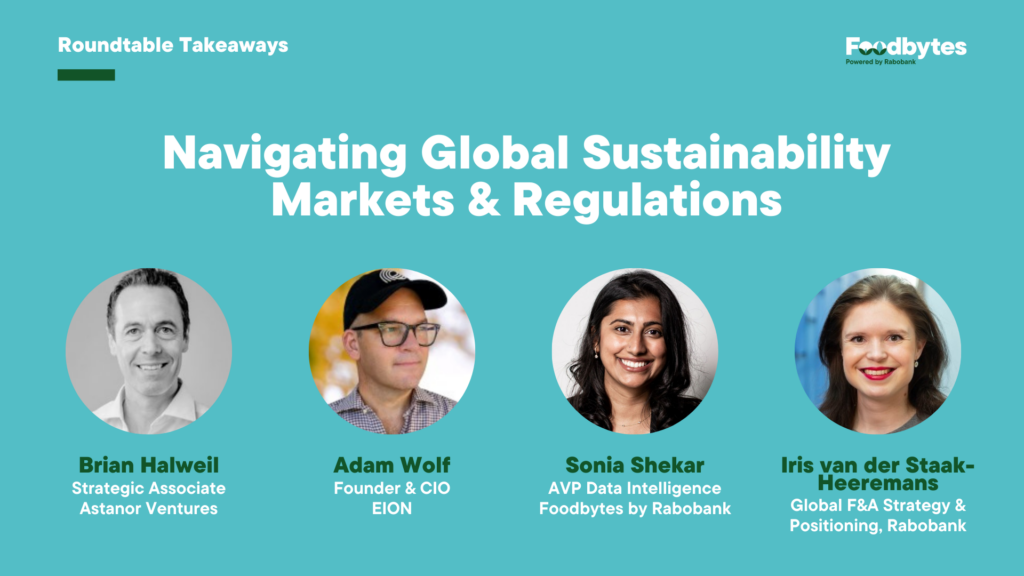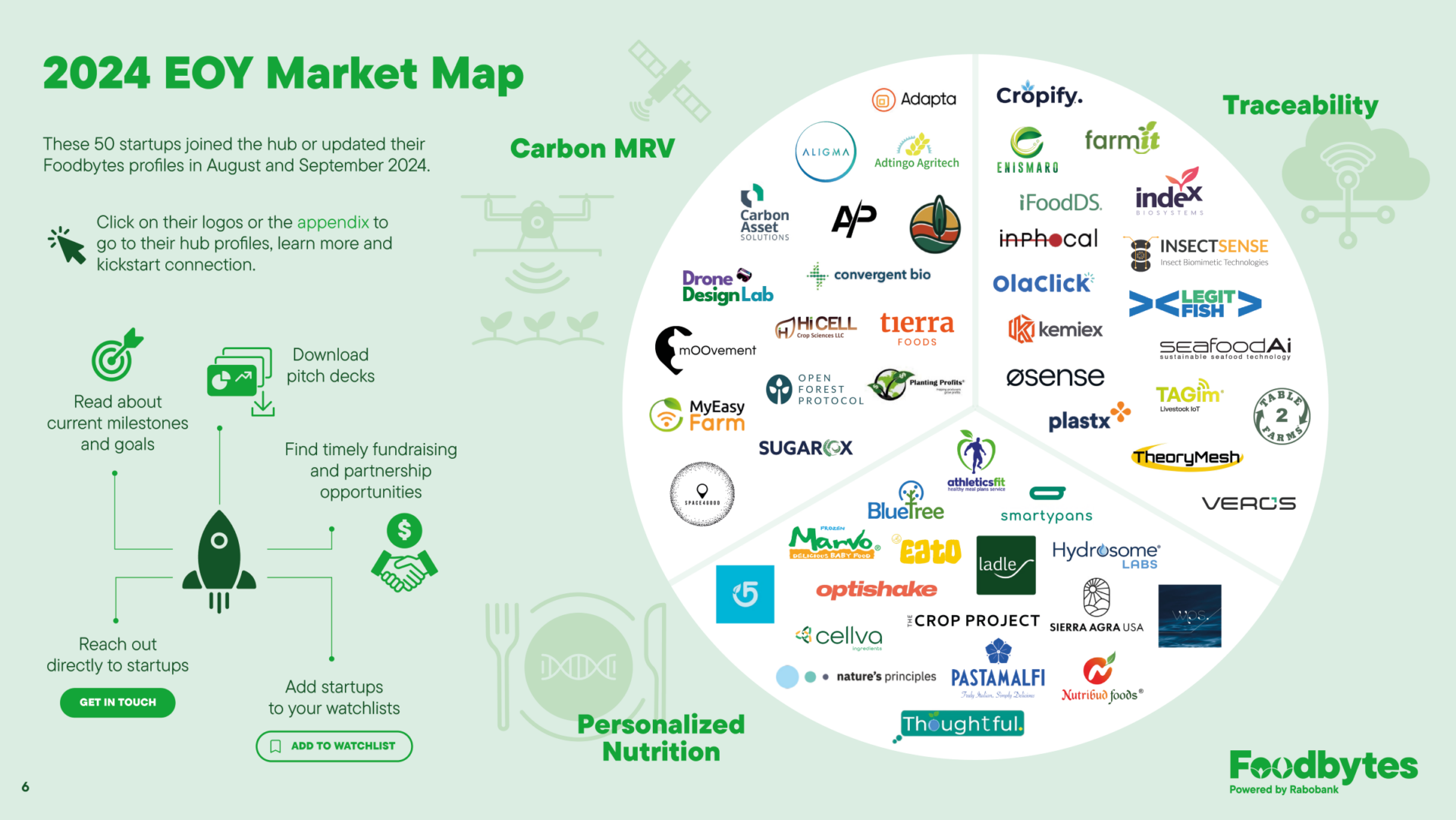
Your Sustainability Playbook: Navigating Global Sustainability Markets & Regulations
“This webinar was fantastic. I’ve been working on SDG’s for many years now. This is one of the very few times when you relate to every single word which is being spoken.” – Startup Attendee
Foodbytes hosts bimonthly, startup-exclusive virtual roundtables featuring a panel of experts across the food and ag industry and within Rabobank, with dozens of global startup founders attending, and the latest roundtable discussed sustainability markets and regulations. Want to get invited to our next roundtable? Take 5 minutes to create your Foodbytes profile.
On August 7, our roundtable session explored the current forces in sustainability regulation and target setting, focusing on the food system’s role in creating measurable change. The conversation featured Astanor Ventures Strategic Associate Brian Halweil, Eion Founder & CIO Adam Wolf, Rabobank Global F&A Strategy & Positioning Strategist Iris van der Staak – Heeremans and Foodbytes Data Intelligence AVP Sonia Shekar.
Over the past decade, many companies have set ambitious goals following the Paris Agreement, hoping for scalable technologies like carbon capture. Post-pandemic, there was a surge in aggressive Scope 3 target setting, peaking in 2020 as supply chain fissures ignited enthusiasm to overhaul global systems. However, recent headlines suggest these goals are being scaled back en masse. Despite this, the Science Based Targets initiative (SBTi) reported a doubling in the number of companies setting validated climate targets in 2023 compared to the year before, indicating a shift towards more realistic and achievable goals.
Setting Global Sustainability Priorities
with Iris van der Staak-Heeremans – Rabobank Global Food & Ag Strategy and Positioning Team
Iris van der Staak-Heeremans from Rabobank’s Global Food & Ag (F&A) Strategy and Positioning Team discussed the bank’s approach to sustainability in the food and agriculture sector. Rather than viewing F&A as a single sector, Rabobank breaks it down into various sub-sectors like animal protein, ag commodities, dairy, farm inputs, fresh produce, packaging & logistics and food & beverages.
While carbon has been a major focus, Rabobank is now additionally prioritizing nature as a key sustainability area. The bank collaborates with clients and industry partners to translate specific agricultural practices into measurable metrics and vice versa. For each of the F&A sectors, van der Staak-Heeremans’ team created a separate strategy.
This process begins with analyzing the market outlook, identifying changes and hurdles, main sustainability developments, assessing Rabobank’s current market position and determining its desired future position and the steps the bank can take to support clients in their transition. A key issue for the fresh produce sector, for example, is water availability. To address this, Rabobank initiated pilots with clients in the US and Chile, collaborating with two different companies.
“For the first pilot, we partnered with Foodbytes alumni Arable. The goal was to understand the critical water-related metrics for our clients and how these metrics aid their decision-making processes. Additionally, we aimed to identify the metrics we, as a bank, need to understand our clients’ water requirements and potentially develop a water index, starting with fresh produce. Arable developed on-site devices to measure water needs for different crop types and stages in development combined with weather predictions, and more. Clients appreciated the system’s ability to consolidate multiple information points, simplifying their irrigation decisions.”
– Iris van der Staak-Heeremans, Rabobank Global F&A Strategy & Positioning Strategist
Venture’s Role in Evaluating Impact to Drive Systemic Change
with Brian Halweil – Astanor Ventures Strategic Associate
Impact-focused funds, particularly in the food and agriculture sector, can catalyze a shift from traditional farming and eating practices to more sustainable and innovative approaches. The current food system is deeply entrenched, with significant investments in conventional methods of seed creation, soil fertilization, pest control and farm infrastructure and machinery. Transitioning to environmentally and socially sustainable practices requires substantial capital.
As an impact fund, Astanor Ventures prioritizes investments with significant social and environmental impact, often passing on otherwise promising opportunities if they lack a strong impact argument. Potential investments are assessed using six key performance indicators (KPIs) to measure impact across: greenhouse gas emissions, biodiversity, water, social health, climate intelligence and impact intelligence (how well companies disseminate information about their impact).
Astanor’s investment in plant protein companies illustrates their impact calculation process. These companies aim to replace animal-based proteins, which typically have higher greenhouse gas emissions. By evaluating the greenhouse gas emissions reductions, water usage and biodiversity impacts of these companies, Astanor can quantify the overall impact. They then assign a dollar value to these impacts and calculate the impact multiple of investment (comparing the dollar value of the impact to the amount invested). With alternative protein, the impact varies by market, with human food having the highest impact. By focusing on markets with the most significant impact, Astanor maximizes the positive effects of its investments.
“In my previous career as a food journalist and researcher, I believed that raising awareness through storytelling was key to transforming our food system. While awareness is crucial, I realized that true change necessitates direct investment in companies, entrepreneurs and new infrastructure.”
– Brian Halweil, Strategic Associate, Astanor Ventures
Emerging Technology’s Role in a New Regulatory Landscape
with Adam Wolf, Eion Founder & CIO
Regulation plays a key role in providing market access and catalyzing new business models. Eion Founder and CIO Adam Wolf highlighted the importance of engaging with trade groups like the Carbon Removal Alliance and the Carbon Business Council to stay informed about policies and leverage opportunities in the regulatory landscape. This proactive approach helps Eion navigate the evolving policy environment and maximize the impact of its technology.
In Europe, frameworks like the Emissions Trading Scheme and the Green Claims Directive mandate balancing greenhouse gases and substantiating environmental claims. In contrast, the US focuses more on incentives like tax credits, with specific relevance to biofuels and farming practices. Both US and EU corporates are navigating this evolving policy landscape, often leading to multi-year strategic initiatives.
Eion focuses on carbon removal and the broader impacts of its projects. Their rock-based powder, made from finely ground primary mineral material, permanently removes carbon dioxide from the atmosphere while improving soil health by managing pH levels. This dual benefit alignment with farmers’ existing practices is crucial for introducing new technologies and driving adoption. Wolf emphasized the importance of creating quantifiable impact from the outset, ensuring that Eion’s projects contribute to both carbon removal and rural economic development.
“We all have a fundamental belief in the power of working lands to create environmental goods. The public often views farmland as a source of environmental harm, yet the people touching all those acres every year are potential catalysts for addressing many complex problems. Aligning with farmers’ existing practices is crucial for introducing new behaviors and technologies.”
– Adam Wolf, Founder & CIO, Eion
